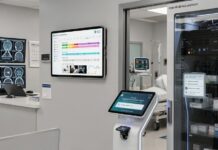Royal Philips announced that it has signed a licensing agreement with Visiopharm to offer their breast cancer panel software algorithms1 with Philips IntelliSite 2 digital pathology solution to help pathologists with an objective diagnosis of breast cancer.
Applying smart computer processing to the digital tumor tissue image, the companies believe that the pathologist will be able to achieve a more consistent reading and diagnosis to help inform the patient’s treatment regime. Visiopharm’s breast cancer panel software (Ki-67 APP for Breast Cancer, Her2 APP for Breast Cancer, ER APP for Breast Cancer and PR APP for Breast Cancer) are CE marked for diagnostic use in Europe1.
Through strategic investments in R&D, an acquisition, partnerships and technology licenses, Philips is building a leading portfolio for the digitization of pathology, a fast-growing area in healthcare as pathology labs are looking to improve productivity and enhance quality.
The pathologist plays a critical role in disease detection such as cancer by examining suspected tissue under a microscope. The American Society of Clinical Oncology reported3 that current HER2 (breast cancer) testing may be inaccurate. Specifically, the assessment biomarker status of cancerous cells in tissue proved to be subjective with variability in readings amongst pathologists. Studies have shown that digital image analysis in support of the pathologist assessment actually outperform manual biomarker assessment in this task4.
“Over the past 150 years, the pathologist has used a traditional microscope to diagnose cancer and other diseases,” said Visiopharm CEO Dr. Michael Grunkin. “Rapid advances in digital imaging coupled with the use of powerful new analytic methods promise to radically change the future of pathology. Combining the high image quality from Philips’ IntelliSite pathology solution with Visiopharm’s reagent agnostic diagnostic image analysis is the first step towards improving data quality in histopathology.”
Digitization of pathology will open up new ways to get more information from tissue samples. High quality digital images and world class image analysis will facilitate the objective analysis of images. With advanced algorithms and data management systems, Philips aims to help to translate the big data into actionable knowledge and equip pathologists with needed tools to enable a more accurate and precise diagnosis which could help providing more personalized treatment.
“We are committed to empower pathologists with the best tools to fight cancer,” said Russ Granzow, General Manager of Philips Digital Pathology Solutions. “With computational pathology we continue to innovate with the goal to improve the effectiveness and quality of cancer diagnosis.”
Philips lntelliSite pathology solution is an automated digital pathology image creation, management and viewing system comprised of an ultra-fast pathology slide scanner, an image management system and dedicated software tools. Across the globe, several high-volume and networked pathology institutions are relying on the Philips IntelliSite pathology platform for improved workflows, enhanced collaboration capabilities and provide new insights that ultimately could lead to better patient outcomes.
[1] Visiopharm breast cancer panel software (Ki-67 APP for Breast Cancer, Her2 APP for Breast Cancer, ER APP for Breast Cancer and PR APP for Breast Cancer) are CE marked for diagnostic use in Europe. These algorithms are for research use only and not approved for use in diagnostic procedures in the United States and Canada.
[2] In the European Union, the Philips IntelliSite Pathology Solution is CE Marked under the European Union’s ‘In Vitro Diagnostics Directive’ for in vitro diagnostic use. In Canada, the Philips IntelliSite Pathology Solution is licensed by Health Canada for in vitro diagnostic use. In the United States, the Philips IntelliSite Pathology Solution is indicated for in vitro diagnostic use for Manual Read of the Digital HER2 Application. The Philips IntelliSite Pathology Solution is registered for in vitro diagnostic use in Australia, Singapore and Middle East.
[3] Guideline for HER2 Testing in Breast Cancer—Wolff et al, Arch Pathol Lab Med—Vol 131, January 2007
[4] Digital image analysis in breast cancer – G Stålhammar et al Modern Pathology (2016) 29, 318–329

















